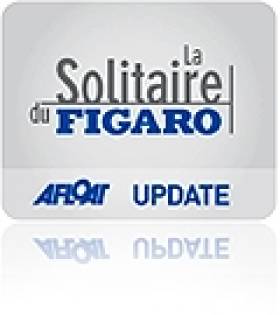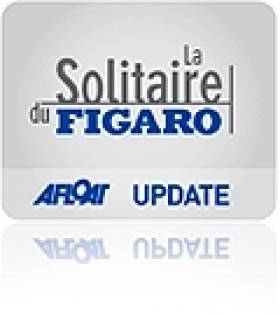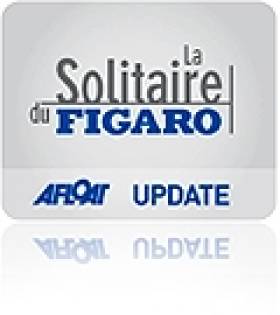Displaying items by tag: Nigel King
King who is no stranger to this annual, French 1,695-mile marathon, having competed in it twice before (2007 and 2009) has put a lot of work into this particular campaign in an effort to improve on his previous performances. Now, with support from his sponsors including title sponsor E-line Orthodontics, and the Artemis Offshore Academy, King says he is fairly happy with preparation for this race and is now looking forward to getting started.
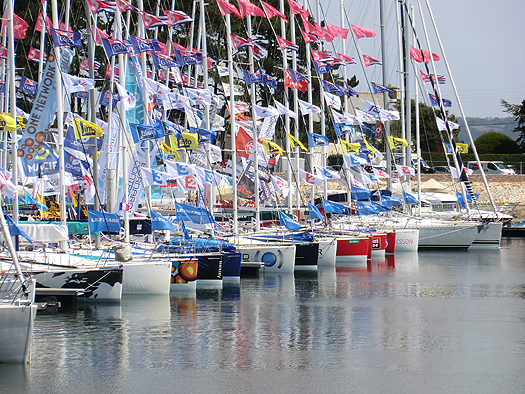
Chatting from the dockside this morning, King commented: "I am actually really excited about the prospects of this one, and thankfully less nervous than I was in 2009. I think because I'd had such a bad one in 2007, when I had to abandon the race, I had a lot of pressure to improve. Thankfully I had a decent result finishing 23rd, but I am now keen to improve on that."
King admits to having set himself a much harder target for this race, but because he has learnt such a lot over the last two years and knows what to expect from the race, he says he has more confidence in his own ability. "I now feel it is achievable and realistic to get a good result but to do so, I am going to have to sail the best I've ever sailed in a Figaro as there are some exceptionally talented sailors out there."
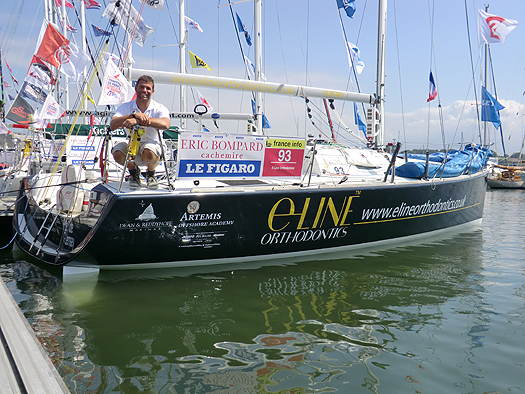
One of King's most recent successes was finishing a creditable second place overall in the solo Transmanche Race aboard E-line Orthodontics where many of the top Figaro sailors were competing. Before heading to France for the Solitaire du Figaro, King completed the Transatlantic Race as skipper aboard Chris Bull's Cookson 50, Jazz, finishing first overall in IRC Class 2.
The Solitaire du Figaro however, is the key event in the Figaro circuit, which means the competition is always extremely high. Racing takes place in identical Figaro Bénéteau 2 class yachts to a strict, one-design rule to ensure the racing is fair as possible but because the four-leg race spans over a month (from 31 July- 28 August), and the course takes the fleet to and fro across the Channel, it is tactically extremely challenging.
Commenting on the start and the first 320-mile leg of the race from Perros-Guirec to Caen, northern France, King says it will be interesting: "The current weather situation shows light winds not only for the Prologue later today, but also for the start on Sunday. It seems like we won't get much more than 10-15kts which means the tidal effects will play a big role."
Although it hasn't been confirmed yet, the course of the first leg is likely to take the fleet from northern France to a waypoint at the Needles Fairway off the Isle of Wight. Having started at 1100 local time on Sunday, the estimated time of arrival at the Needles will be sometime on Tuesday, which means anyone in the vicinity should get a spectacular sight of the fleet. If the long-term weather forecast remains light, however, the fleet will be sent directly to Caen.
Follow Nigel King's progress aboard at nigelkingyachting.com, or follow the race at www.lasolitaire.com/EN
UK sailor Nigel King who recently finished a creditable second place overall in the Transmanche Race sailing his Figaro class yacht – E-line Orthodontics – is currently competing in the Transatlantic Race aboard Chris Bull's Cookson 50, Jazz writes Sue Pelling.
King's recent success in the highly competitive Figaro class, was just the sort of result he was looking for in the run up to the Solitaire du Figaro – the key event on the Figaro circuit – which starts in less than a month's time (29 July).
King will be sailing into Dun Laoghaire when the Figaro race stops here in August.
As a passionate, and particularly versatile sailor who manages to compete equally well solo or in a team, King's aim as skipper of Jazz in the Transatlantic Race is to ensure the yacht obtains the best possible result for owner Chris Bull, who had to pull out the race to attend his son's wedding.
Speaking from the dockside in Newport Rhode Island just before he started the Transatlantic Race earlier today King said: "Chris is a very active sailing owner, so for him not to be here for this race is a big thing. What is even more significant is the fact that he is allowing us to race his boat without him. We as a team all recognise we are pretty fortunate to have an owner who puts his trust in us entirely, so we really need to make sure we deliver on results, and getting the boat across the Atlantic safely."
King, who is skippering Jazz, will be working closely alongside Mike Broughton (navigator) and Christian Rippard (principal helmsman) during the 2,975-nautical mile race from Newport Rhode Island to Lizard Point, England. Other members of the team include Anthony (Ski) Haines (boat captain), and a selection of Australians who, according to King, are a great bunch of guys. "They are really hardworking and into their sailing and ultra competitive. They all work well together which means we have a really good team onboard."
The Transatlantic Race is a key event in the seven-race Atlantic Ocean Racing Series, which means to qualify for the series; at least three races must be completed including the Transatlantic Race. Having completed two races already this season – the RORC Caribbean 600, and the Annapolis to Newport Race – Team Jazz is looking forward to a respectable result in her third, qualifying race. Speaking realistically about what lies ahead, King said: "I am not a great believer in saying 'we are going out there to win'. If you go out there with nothing but a win as your goal, you focus so much on that you forget to sail properly. We've talked about how we want to perform and that is to sail to the highest level we can and hope that, if we make all the right choices and minimise our mistakes, the result will come."
King estimates a 14-day crossing depending on the conditions. According to the forecast the first few days could bring a light to moderate south-westerly breeze. King added: "There's a bit of a front coming through which is kind of messing the picture up a bit but we could have a few days of potentially 10-15kts, maybe slightly more spinnaker running as we go up the coast to Nova Scotia depending on whether we take a southern or northern route."
Once they cross the finish line at the Lizard, the team will have a 24-hour delivery trip back to Cowes for the prizegiving event at the Royal Yacht Squadron. For King however, it will be a case of jumping ship again, this time back onboard his Figaro – E-line Orthodontics – where he'll sail back to his home in Lymington before heading straight across the Channel to Perros-Guirec, France for the start of the Solitaire du Figaro.
Preparing for the Challenge of La Solitaire du Figaro
Dubliner Paul O'Riain's comprehensive article on his Figaro debut experience in 2007 has moved, Click this link for it and the latest La Solitaire du Figaro news.



























